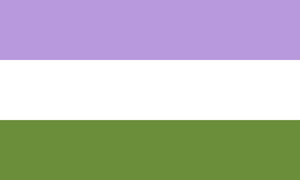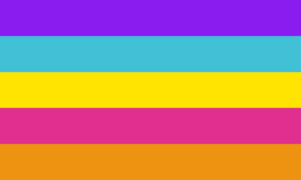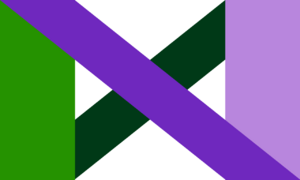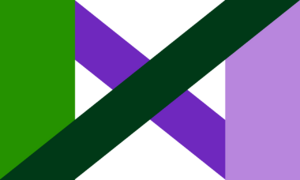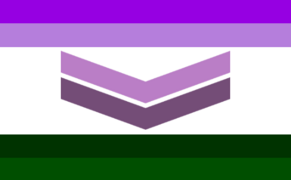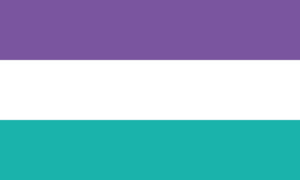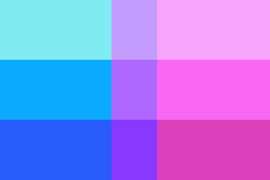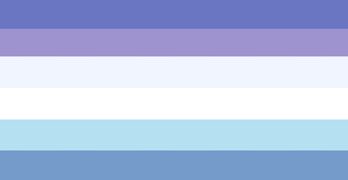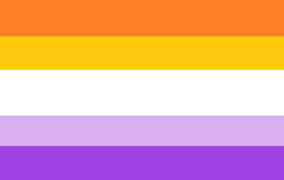Pride Gallery/Genderqueer: Difference between revisions
imported>TXJ mNo edit summary |
imported>TXJ (Fixed typo "neutrosis" -> "neutrois") |
||
| (5 intermediate revisions by 2 users not shown) | |||
| Line 7: | Line 7: | ||
<gallery mode="packed-hover"> | <gallery mode="packed-hover"> | ||
Genderqueer.png|{{#simple-tooltip:Meaning|-Lavender (mixture of blue and pink): androgyny.<br>-White: gender neutral.<br>-Green: inverse of lavender, for those identities defined outside the binary.}} | Genderqueer.png|{{#simple-tooltip:Meaning|-Lavender (mixture of blue and pink): androgyny.<br>-White: gender neutral.<br>-Green: inverse of lavender, for those identities defined outside the binary.}} | ||
Genderqueer-2.png | Genderqueer-2.png|{{#simple-tooltip:Meaning|1) Purple is for androgyny, a mix of masculine and feminine. 2) Blue is for masculinity. 3) Yellow, as in the pansexuality flag, is for people outside the gender binary entirely. 4) Pink is for femininity. 5) Orange, the opposite of purple on the color wheel, is for people who are agender or neutrois.}} | ||
Genderqueer by willow-weaves (1).png|{{#simple-tooltip:Meaning|The colors themselves mean the same thing [as the most common GQ flag]: green for outside of the binary, violet for a combination of the binary genders, and white for having no gender. The lines are supposed to look like a stylized infinity mobius strip and has an x when perceived as just a flat image to symbolize complex relationships with gender and a rejection of cisnormativity.}} | Genderqueer by willow-weaves (1).png|{{#simple-tooltip:Meaning|The colors themselves mean the same thing [as the most common GQ flag]: green for outside of the binary, violet for a combination of the binary genders, and white for having no gender. The lines are supposed to look like a stylized infinity mobius strip and has an x when perceived as just a flat image to symbolize complex relationships with gender and a rejection of cisnormativity.}} | ||
Genderqueer by willow-weaves (2).png|{{#simple-tooltip:Meaning|The colors themselves mean the same thing [as the most common GQ flag]: green for outside of the binary, violet for a combination of the binary genders, and white for having no gender. The lines are supposed to look like a stylized infinity mobius strip and has an x when perceived as just a flat image to symbolize complex relationships with gender and a rejection of cisnormativity.}} | Genderqueer by willow-weaves (2).png|{{#simple-tooltip:Meaning|The colors themselves mean the same thing [as the most common GQ flag]: green for outside of the binary, violet for a combination of the binary genders, and white for having no gender. The lines are supposed to look like a stylized infinity mobius strip and has an x when perceived as just a flat image to symbolize complex relationships with gender and a rejection of cisnormativity.}} | ||
| Line 13: | Line 13: | ||
Genderqueer by stilesisbiles.png|{{#simple-tooltip:Meaning|Incorporates the colors of the traditional genderqueer flag, plus the lavender queer chevron.}} | Genderqueer by stilesisbiles.png|{{#simple-tooltip:Meaning|Incorporates the colors of the traditional genderqueer flag, plus the lavender queer chevron.}} | ||
Genderqueer by elisamaza.png | Genderqueer by elisamaza.png | ||
Genderfluid - Genderqueer - Bigender by ShinyUmbreon465.png|{{#simple-tooltip: Meaning|Designed in 2020 by Reddit user ShinyUmbreon465, who said it was not aimed at a specific nonbinary identity, but "it would represent anyone who feels like they 'fall in between' man and woman, whether they be a mix of the two, both at the same time, neutral, or androgynous. [...] The plaid design shows how it sometimes feels like there is overlap between multiple genders."}} | |||
Genderqueer by Memedurp.jpg|{{#simple-tooltip:Meaning|Six stripes that represent, from top to bottom, Diversity, Androgyny, Purity, Genderless individuals/Non-conformity, Community, and Protection.}} | |||
Genderqueer by Ryan Phillips - A.R. Vale - Gender Queerdo.png|{{#simple-tooltip:Meaning|The bright orange and yellow are two colours generally considered gender neutral. They represent those who do not fall into the pink (female) or blue (male) but are something else entirely. They are bright, warm colours.<br>The white stripe in the centre represents those with no association with gender at all. It is also taken from the transgender pride flag, showing that genderqueer people are part of the transgender community as well as emphasising that the white stripe in the transgender pride flag (representing non-binary and agender people) is for us.<br>The light lavender purple is the same as the one used in the original genderqueer pride flag. The purples are a combination of pink and blue, the two colours strongly associated with male and female to represent those who consider themselves a mixture of both. Purple is also a colour commonly associated with queerness.}} | |||
</gallery> | </gallery> | ||
}} | }} | ||
Latest revision as of 13:57, 30 April 2022
Genderqueer pride flags
This is the gallery of alternative pride flags for the Genderqueer identity.
Go back to the gallery index - Read about this identity
Tip: hover the flags to see their meaning![note 1]
- Error creating thumbnail: File with dimensions greater than 12.5 MP
Meaning
- ↑ Unfortunately, not all flags have their meaning attached. If you know the meaning of one of them, feel free to add them or contact us!
